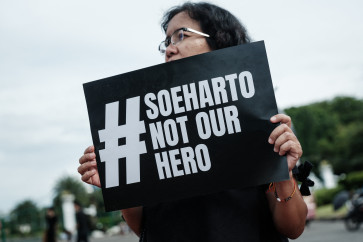Popular Reads
Top Results
Can't find what you're looking for?
View all search resultsPopular Reads
Top Results
Can't find what you're looking for?
View all search resultsSurakarta’s ‘railbuses’ are too heavy for tracks: KAI
Surakarta’s ‘railbus’ system will not start operation in April as planned since the cars for the diesel trams are several tons too heavy for their tracks, according to a transportation official
Change text size
Gift Premium Articles
to Anyone
S
urakarta’s ‘railbus’ system will not start operation in April as planned since the cars for the diesel trams are several tons too heavy for their tracks, according to a transportation official.
“Operating a railbus is not as easy as A-B-C. There are many things that need to be done,” Eko Budianto, the spokesperson of state-owned railway company PT Kereta Api Indonesia (KAI) for the Yogyakarta Operational Region, said.
Infrastructure has been blamed for delaying the operations of the railbus system after it was launched in July 2011 by then Transportation Minister Freddy Numberi.
With a weight of 12 tons, the railbuses are considered too heavy for existing railroad track that only has the capacity of accommodating 10-ton vehicles.
The track needs to be revitalized to facilitate the railbus operation, Eko said.
Works has already begun on 50 meters of track in Gupit in Nguter, Sukoharjo regency, with sections in Surakarta and Wonogiri scheduled to follow.
A railbus is a very lightweight passenger rail vehicle that shares many aspects of its construction with a bus, or modified bus body, and has four wheels on a fixed base, instead of on bogies.
The air-conditioned vehicles, each with a 160-seat capacity, were intended to travel the 32 commuters between Surakarta and Wonogiri, Central Java, at a maximum speed of 80 kilometers per hour.
The Surakarta municipal administration initially expressed optimism that railbus service would operate in mid-April.
Apart from the track snafu, a memorandum of understanding (MoU) has yet to be inked between the Surakarta municipal administration, PT KAI and the Transportation Ministry, Eko said.
Who will pay for maintenance and fuel, a schedule for the system and passenger fares has also yet to be discussed.
“We need to sit together to discuss all of these things,” he said.
PT KAI is reported to have proposed a fare between Rp 30,000 (US$3.27)and Rp 40,000 per passenger , while the municipal administration wants tickets to be priced between Rp 5,000 and Rp 7,000.
“If the rate is set too low, a subsidy will be required. Otherwise, it will not be profitable and therefore would be better off not to be have it all,” Eko said.
He added that the operation of the railbus system would come under the authority of the State-Owned Enterprises Ministry and therefore must yield a profit and contribute to the state’s income.
Surakarta Mayor Joko “Jokowi” Widodo, who has declared himself a candidate in Jakarta’s gubernatorial election, said that fares on the railbus system must be affordable.
“It’s up to PT KAI to decide the fare but it also must take into account the market, because this is a mass transportation system,” Jokowi said.
The project has drawn criticism from local legislators who say that the plan has not been thoroughly vetted.
The legislators complain that they have been overlooked in the project.
“We have never been notified, let alone invited to discuss the project. The fact is that an endorsement from the council is needed for any project worth over Rp 5 billion,” Supriyanto, the deputy speaker of the Surakarta City Council, said as quoted in solopos.com.










